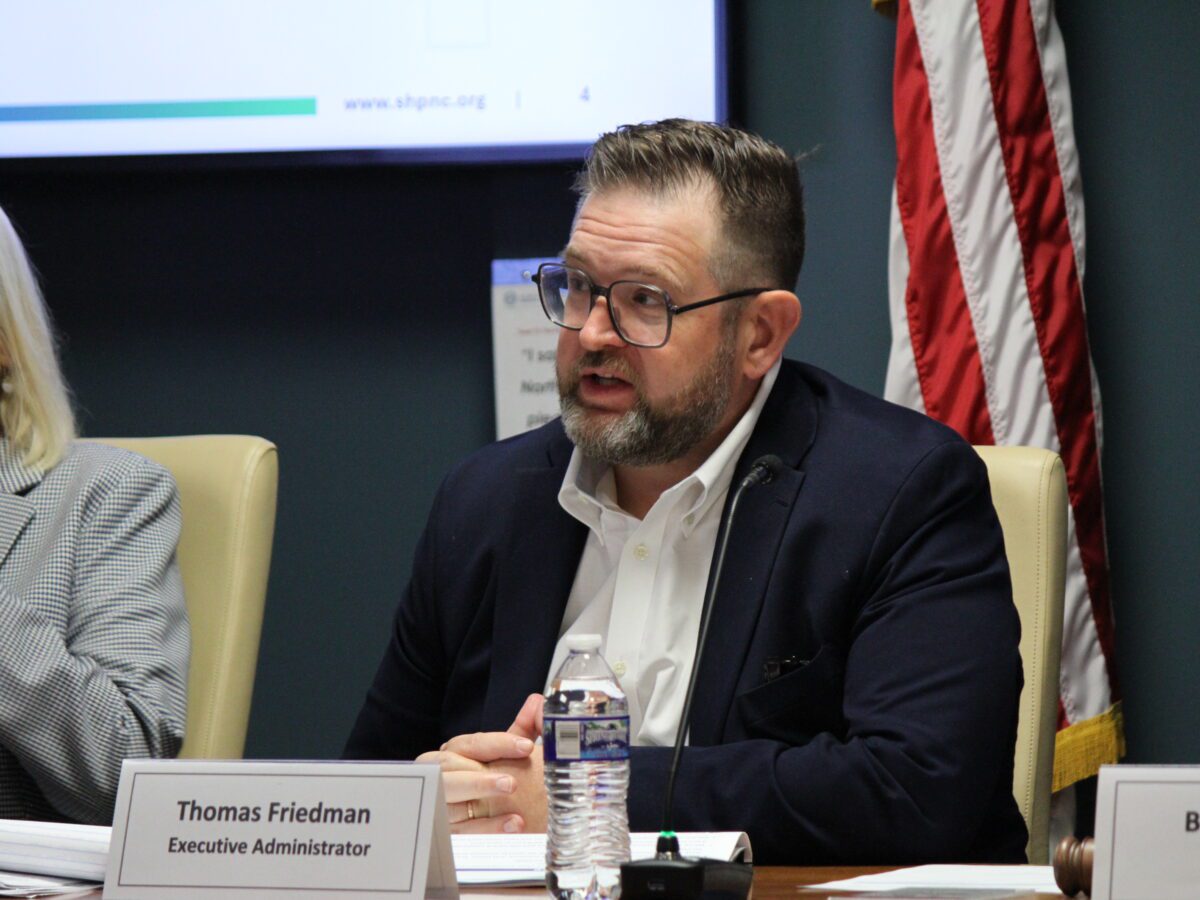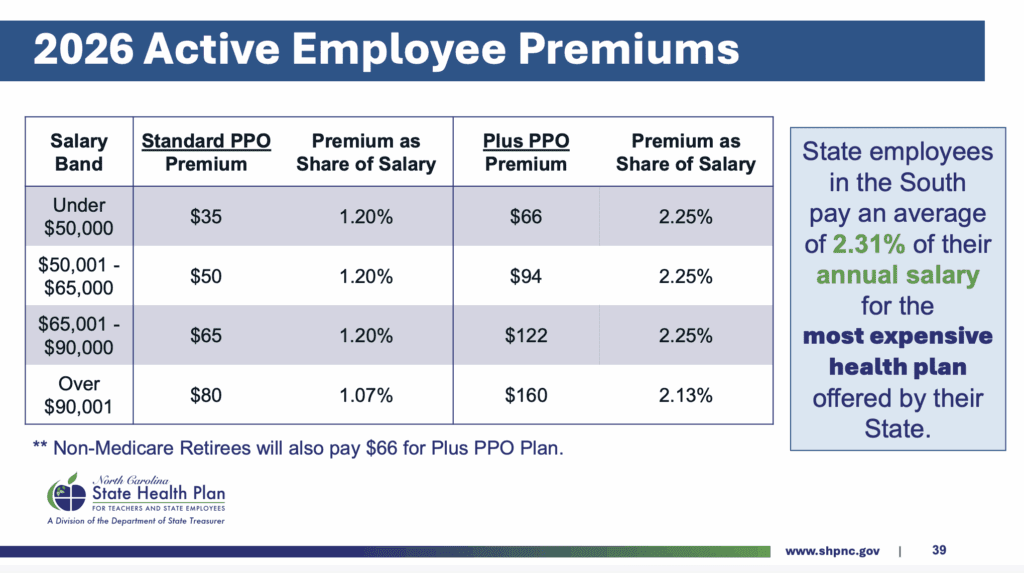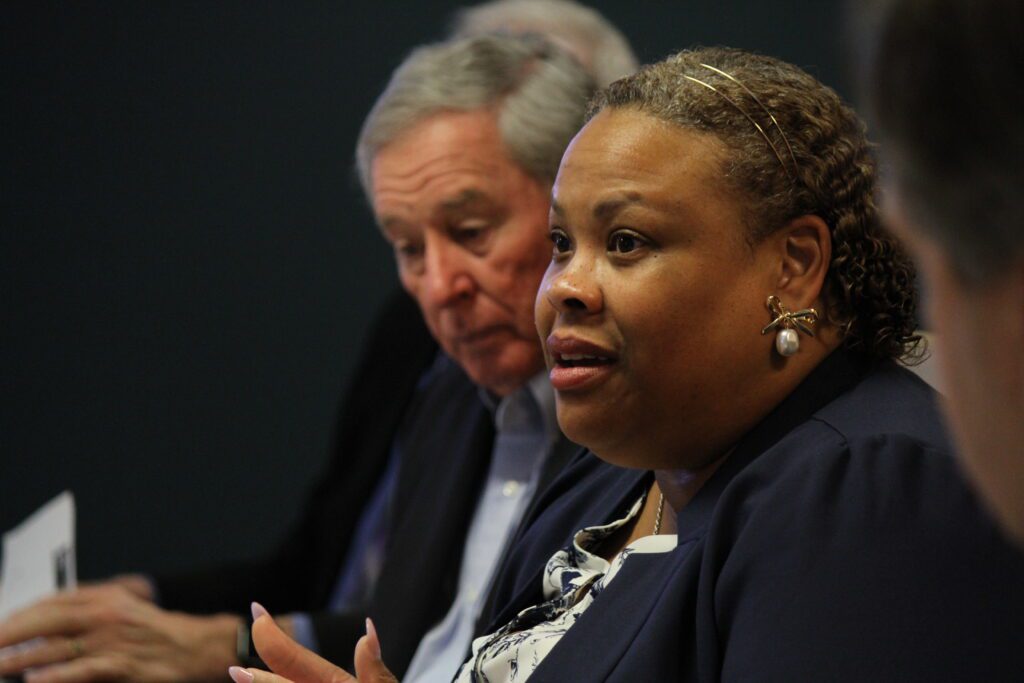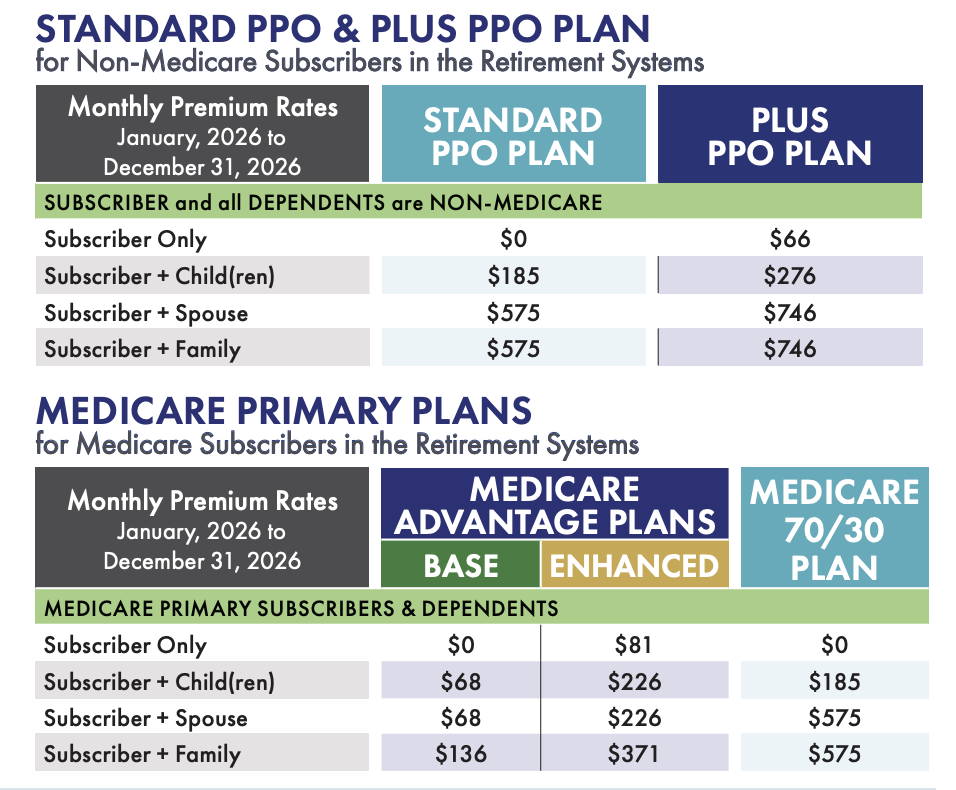
|
|
The State Health Plan Board of Trustees approved increases to health care coverage premiums for members at its meeting on Friday, effective starting in January 2026. While premiums will increase for most members, the new premiums will be salary-based, with lower increases going to members with lower salaries.
This vote comes after the board approved other changes to plan benefits in May, following months of work to address an expected deficit of $500 million for the plan, which could grow to an estimated $1.4 billion by 2027. Now, plan leaders say the plan is in a good place financially through 2028.
“I know no one is happy to be here having this conversation — I certainly am not,” state Treasurer Brad Briner said on Friday morning. “But today marks the day that we turn the page to a better future for the State Health Plan.”
Sign up for the EdDaily to start each weekday with the top education news.
The plan provides health care coverage to nearly 750,000 teachers, charter school employees, community college employees, other state employees, retirees, and dependents.
Currently, members pay $25 for the 70/30 standard plan and $50 for the 80/20 plus plan. Under the plan approved on Friday, that would increase to $35 to $80 for the standard plan, increasing by salary bands, and $66 to $160 for the plus plan.
The premium costs for subscribers with children on their plan is actually lower for most members. Starting in 2026, only the highest paid employees will pay more for the subscriber plus children plan.
“Our lowest paid teachers will pay less in premiums than they did last year to cover their children,” Briner said. “That is a policy decision we’ve made to improve our risk pool … You need to get more healthy people on the plan. You need to make it easier for single parents to cover their kids on the plan.”
Here’s a look at the premiums approved for active subscribers:

Under former State Treasurer Dale Folwell, the State Health Plan did not increase premiums for years. On Friday, Briner said that was because the plan had spent down cash reserves, which are now depleted.
In addition to plan design changes approved in May — including general cost increases across the board, names of plans, and deductibles — Briner said the salary-based premium increases are helping make the plan financially solvent moving forward.
“We’re already looking ahead to phase two, ensuring that we never get back to a situation like this one,” Briner said.
Executive Administrator of the State Health Plan Tom Friedman said plan leaders tried to keep premium costs as a percentage share of an employee’s salary comparable across salary ranges. You can see those comparisons below:

The plan will keep costs steady for retirees and Medicare subscribers, Briner and Friedman said.
You can look at more about rates for these members on pages 42-45 of the board’s presentation.
On Friday, Briner and Friedman said the solvency of the plan relied on everyone contributing a bit more: hospitals and doctors, employees, and the state.
“The burden of this financial crisis is being shouldered by everyone involved with the Plan,” a Friday press release from Briner said. “The Plan is now headed towards a more financially sustainable path.”
At the end of July, the General Assembly passed a mini-budget which increased the annual employer contribution for each covered employee to a maximum of $8,500 for the 2025–26 fiscal year, up from $7,557 per employee.
Without those funds, premiums would have risen an additional $100 across the board, Friedman said.
“We are exceedingly grateful for the listening they’ve done in valuing their teachers and employees,” Friedman said.
Kimberly Jones, the 2023 Burroughs Welcome Fund North Carolina Teacher of the Year, voted in favor of the premium increases, but called on lawmakers to further invest in educators moving forward.
“We have very much thanked our legislators for their investment,” Jones said. “I would add that as we move forward, my hope is that they see the input of the state employees and that they pass a budget that includes reasonable salary increases so that our teachers and our state employees don’t see this very necessary increase in premiums as an even greater hit to their bottom line.”

Other changes discussed
On Friday, the board also highlighted several other plan changes meant to make the plan more affordable and successful moving forward.
First, leaders announced a partnership with Lantern, an Aetna subcontractor, to try to decrease how much the state will pay for surgical procedures by encouraging members in certain regions to go to one health system for that procedure.
According to a fact sheet from the State Health Plan, Lantern will help connect members to “high-quality, carefully selected surgeons when a planned, non-emergency procedure is needed. There will be no cost ($0) for the surgery for members who use a Lantern provider—no deductibles or no copays.”
While the Lantern partnership will start with elective surgeries, administrators are considering adding other services like cancer and maternity care.
Medicare primary members are not eligible to participate in the Lantern partnership, the fact sheet says.
Another change is that the plan now covers all breast cancer screenings — including mammograms, ultrasounds, and MRIs — at 100%.
While Aetna covers all breast cancer screenings, only mammograms are covered at 100% under their preventive benefit.
“Therefore, as of Aug. 1, 2025, the preventive benefit for breast cancer screenings will be updated to include MRIs, ultrasounds, and similar breast cancer screening services in addition to the already covered Mammograms,” the meeting presentation says.
On Thursday, Friedman told the media that the new premiums also remove tobacco attestations, where someone could pay a lower premium for saying they do not use tobacco products.
Finally, the Health Plan is also working to revise its Preferred Provider Program, Briner said.
Plan members will receive more information regarding benefits and premium rates prior to the 2026 Open Enrollment period, which will take place Oct. 13-31, 2025.
The State Health Plan board meets next on Nov. 7.
“Today’s vote was not easy, but these increases were necessary to keep the Plan solvent and to keep this benefit in place for those that serve and have served the state of North Carolina,” Briner said in the press release. “The goal now is to move forward and focus on ways to improve benefits through transparency and better partnerships and programs to keep our members healthy.”
Recommended reading




